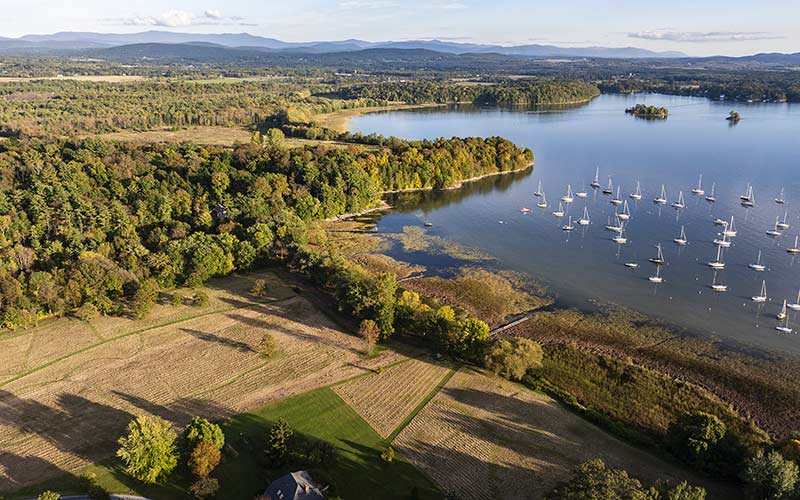
Detail-Farm-on-Lake-Champlain-EcoPhotography
May 30, 2025 (Montpelier, VT) – Vermont’s lawmakers have passed a bill that modestly improves how water pollution from farms is regulated, but the legislation stops short of confronting the root cause of the state’s ongoing inability to fully protect its waters.
The legislation, S.124, includes several valuable measures. It requires state regulators to protect all Vermont waters, to follow federal law as a baseline, and to bring together stakeholders for input before next year’s legislative session. However, the bill maintains core elements of an existing system that the Environmental Protection Agency (EPA) has deemed ineffective and in need of reform.
“We’re in the middle of a long-term process to build a better regulatory program,” said Scott Sanderson, director of Conservation Law Foundation’s farm and food initiative. “This bill takes important first steps and creates a needed stakeholder process, but it doesn’t confront what EPA identified as a root cause of Vermont’s broken system: the division of jurisdiction over agricultural water pollution between the Agency of Natural Resources and the Agency of Agriculture.”
EPA issued a letter last year finding that Vermont does not adequately regulate farm pollution under the federal Clean Water Act. EPA directed the state to develop a plan to establish a regulatory system run by the state’s Agency of Natural Resources (ANR). Vermont’s lawmakers have instead passed legislation that continues to split authority over agricultural water pollution between ANR and the Agency of Agriculture, Food, and Markets. EPA’s letter came two years after CLF, along with Vermont Natural Resources Council (VNRC) and Lake Champlain Committee (LCC), filed a petition that prompted EPA to thoroughly investigate how Vermont applies the Clean Water Act on farms.
“Consistent enforcement of water pollution standards is critical to protecting Lake Champlain. The Lake Champlain Committee appreciates the time and attention Vermont legislators have devoted this year to this complex issue, but there is still significant work to be done,” said Jenny Patterson, Executive Director of LCC. “We look forward to participating in the stakeholder process and future legislative discussions as we continue to advocate for fair, effective regulation that supports farmers and delivers clean water to our treasured lake.”
Jon Groveman, VNRC Policy and Water Program Director said, “The Petition filed with EPA by CLF, VNRC and LCC makes it clear that Vermont is not enforcing against illegal farm pollution and Vermont must take action. S.124 is a first step towards correcting the problems that have led to these illegal discharges. However, there is significant work ahead to fully fix Vermont’s farm pollution program.”
CLF will continue to advocate for true reform to improve Vermont’s water quality and will not stop advocating for a better system for all Vermonters.
CLF experts are available for further comment.
###
